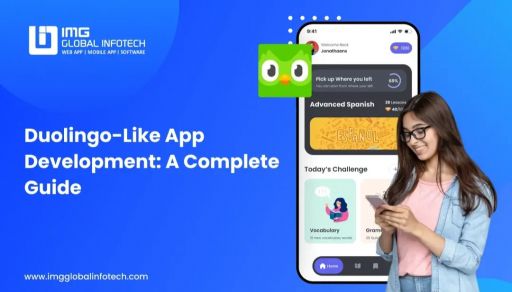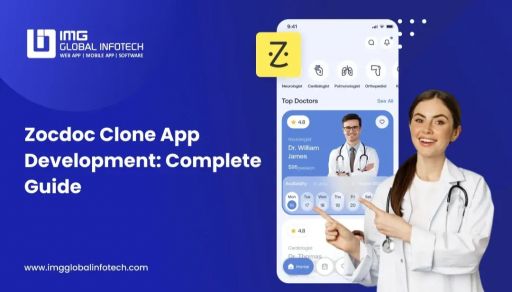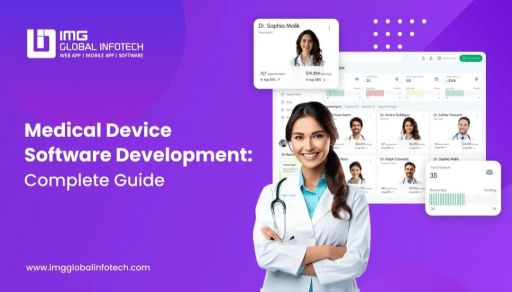Native Vs. Cross-Platform Development: Which Is The Best For Your App Idea?
Lokesh Saini
Nov 25, 2025
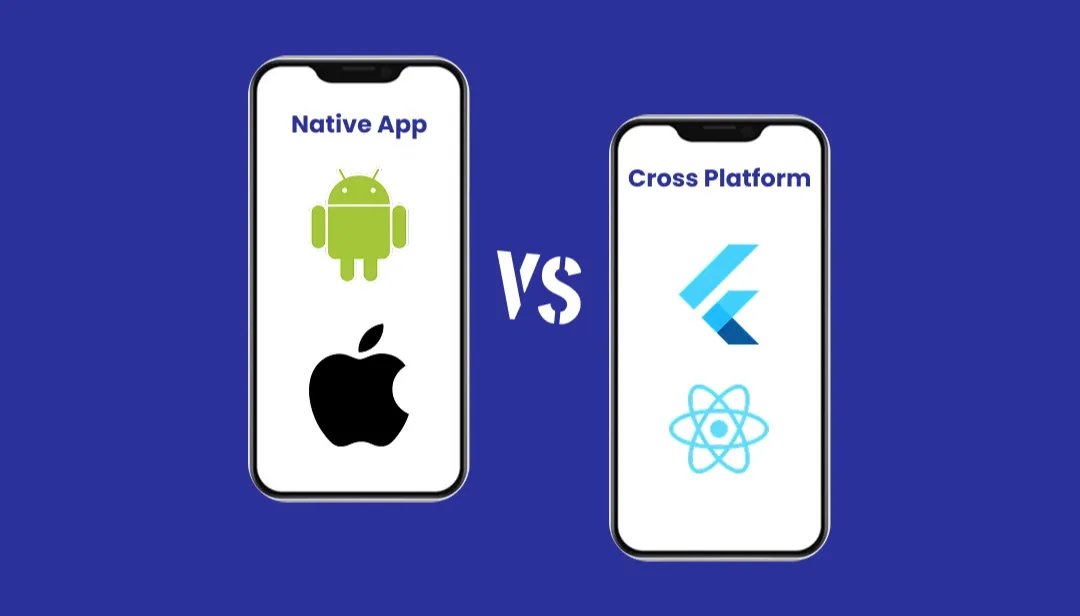
In mobile app development, we have seen many elements that can build a custom app for your business. We have already talked a lot about every single element in our blogs but we have never talked about this element and it is also crucial in mobile app development, and it is a framework. A framework is an important part of any mobile and web development. This is the first statement of the framework.
In other statements, let's clarify this concept in detail as well. With my ongoing love for developing apps for mobile devices, there has been no shortage of discussions and endless confusion about Native vs Cross-Platform Development methodologies - especially among beginner programmers.
This is one of the big discussions in app development companies. In this blog, let's understand the concept of native cross-platform development and which one is the best for your app idea. We will also address some other topics in this blog, but first let's start this blog by understanding the meaning of native and cross-platform frameworks as well.
What is Native App Development?
This way of making applications creates applications employing languages and frameworks that are only available for one platform. In other words, when developing an iOS application and an Android application, they will be developed independently since the former will use Java or Kotlin and the latter will use Swift and Objective-C.
However, react native app development services are favored by developers because they generate better performance, whereas organizations are deterred by the price of the native development.
What is Cross-Platform App Development?
Unlike the previous approach to app creation, which required developers to utilize a specific set of technologies for each OS, this approach is creating mobile apps that work on multiple platforms.
Developers can write cross-platform code in the most widely used programming languages, and then after it is written, they can reuse it in other applications in Cross-platform mobile app development. Although originally developed for simple mobile applications and games, the Cross-platform mobile app development framework has now become the preferred alternative to the method described earlier for building software applications.
Native vs Cross-Platform Development: Key Differences
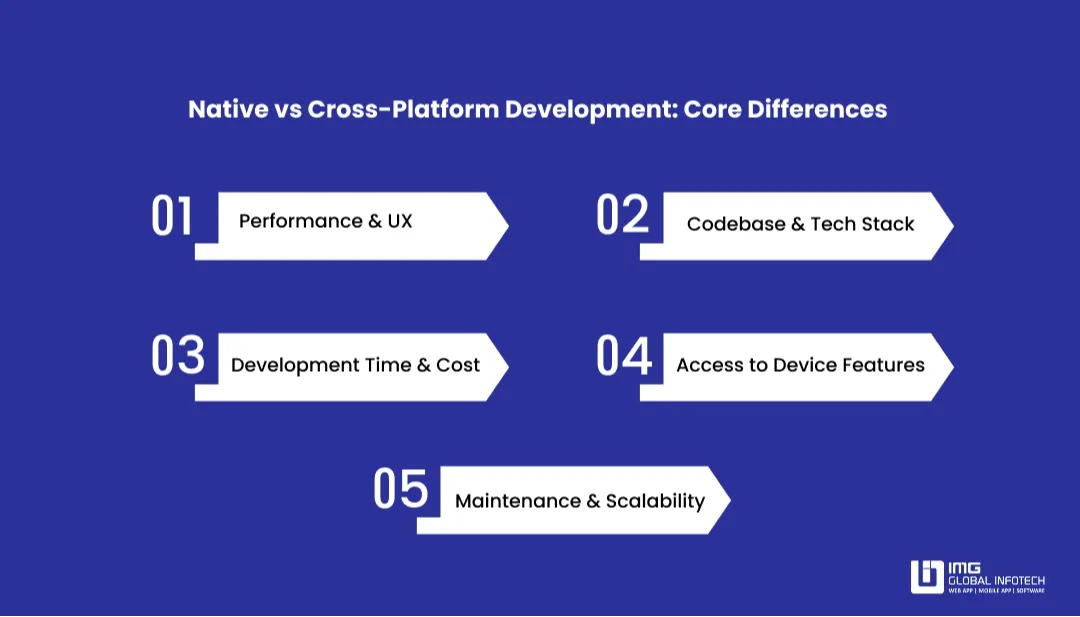
Here are some major core differences between Native and Cross-Platform Development as well:
Performance & UX
Native applications run closer to the device hardware, delivering smoother animations, faster load times, and more responsive interactions—especially for features with heavy graphics or real-time functionality for the Best app development approach. Cross-platform applications introduce an abstraction layer or runtime, which can cause minor performance overhead and a slightly less "native" look-and-feel in complex interfaces.
Codebase & Tech Stack
Native development involves separate codebases and platform-specific languages: Swift/Objective‑C for iOS and Kotlin/Java for Android, which increases code volume and duplication of App development frameworks. Cross-platform development depends on a single key codebase with shared business logic, normally through frameworks like React Native or Flutter. That reduces duplication but it still may need some native modules.
Development Time & Cost
Building and maintaining two native apps generally requires larger teams, longer timelines, and higher budgets due to duplicate work across platforms of Native vs hybrid app development. Cross-platform development reduces time-to-market by reusing most code, thus lowering the initial build and maintenance costs, which is quite attractive for startups and MVPs that aim at iOS and Android simultaneously.
Access to Device Features
Native applications immediately have full access to platform APIs, sensors, new OS capabilities, and vendor-specific features upon release of the latest Mobile app development technologies. Cross-platform applications depend on the framework's support and plugins for deep hardware or OS integrations, which lag behind sometimes and limit or complicate the use of the most up-to-date native features.
Maintenance & Scalability
Native projects involve the parallel maintenance of several codebases, independent bug fixing, and feature rollouts for each platform. In cross-platform applications, most of the logic is centralized, which supports single-point fixes and synchronized updates; thus, this simplifies the ongoing maintenance, though complex apps may still build up platform-specific code over time for performance or feature reasons.
Advantages of Native App Development
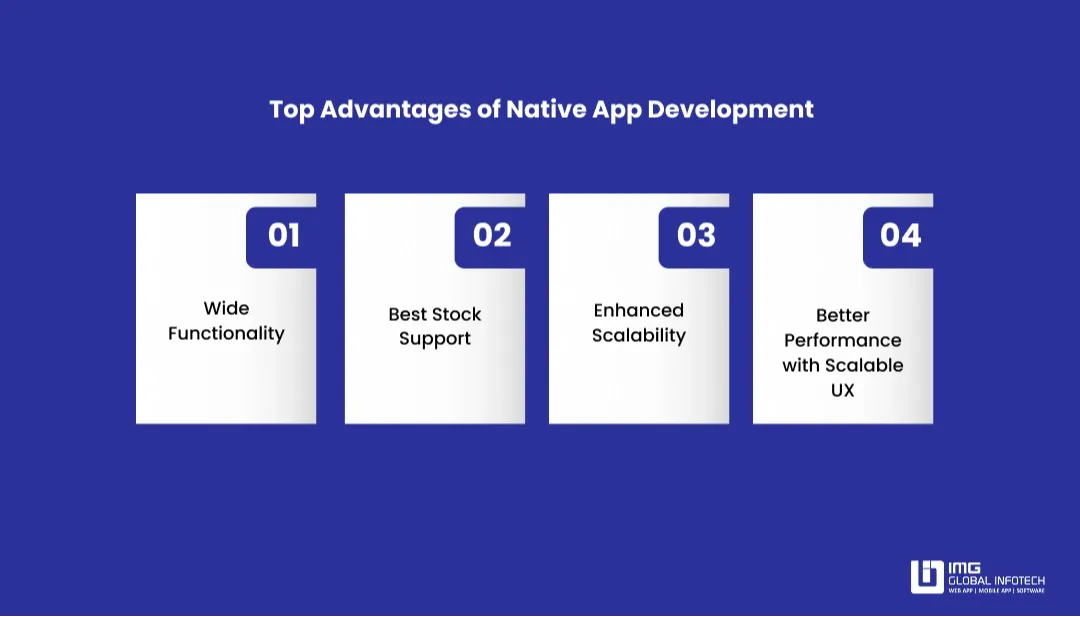
Here are some benefits of implementing Native App Development as well:
Wide Functionality
From native app development you will get access to all of the APIs and tools that are available on this platform. There is also no need of technical constraints for programmers to develop a new app in its base.
Best Stock Support
Through native app development, you can also integrate high-level programming language to build complex mobile apps seamlessly in Mobile app development technologies. You will also get a great tool range that can help you to build an app as well.
Enhanced Scalability
As we know, native apps are more scalable as compared to other app development. It also includes resource management, which contains a great range of tools that would be helpful to develop a custom app as per the given needs and requirements.
Better Performance with Scalable UX
It can also provide high performance from the direct contact between the code and the underlying resources by the Mobile app development guide. Additionally, the native apps can be directly linked with prototyping tools for UX design. It can offer a premium user experience on this platform as well.
Advantages of Cross-Platform App Development
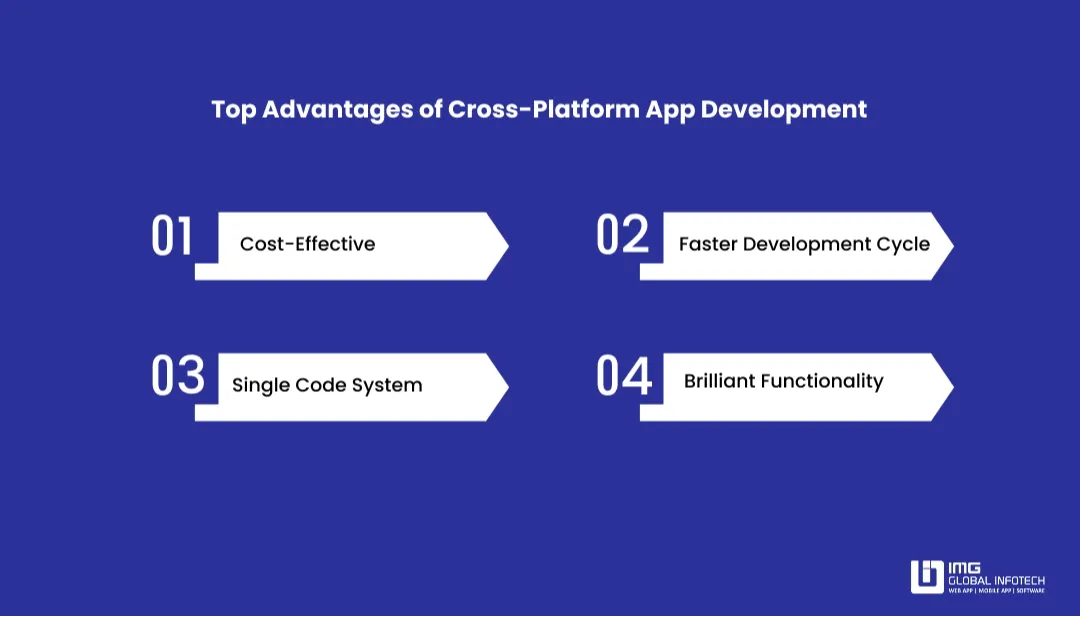
Here is a list of some Cross-platform app benefits.
Cost-Effective
To build an app on a cross-platform, you only need a single development team instead of two teams. As a result, this is a cost-efficient strategy to save costs in the development process as well.
Faster Development Cycle
In other app platforms you need to operate the app for various platforms. But in cross-platform you only need a single development cycle that can save a lot of time in the work process as well.
Single Code System
In cross-platform app development, there is only one code base needed while developing any app in Cross-platform frameworks. It can reduce the complexity level, which can save a lot of effort for developers in their work process.
Brilliant Functionality
It provides access to developers that can connect their apps with different components of a smartphone. It majorly includes camera, microphone, and geolocation in App development frameworks. Sometimes developers can face difficulties, but they can be solved easily as well.
Native vs Cross-Platform Cost Comparison
Here is the comparison table that showcases the average app development cost for native vs app development, which is mentioned below:
Top Cross-Platform Frameworks to Consider in 2026-26
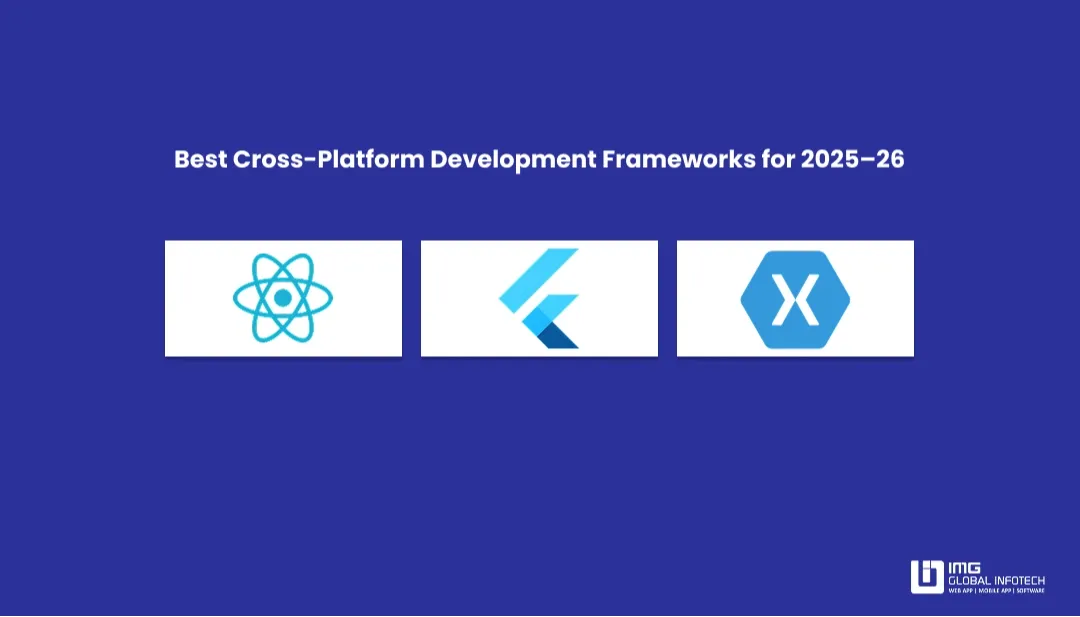
When developing mobile apps that must function flawlessly on both iOS and Android, selecting the appropriate cross-platform framework is essential for the App development company. The following are some of the most popular frameworks that let programmers make effective, powerful, and aesthetically pleasing apps:
React Native
React Native, developed by Meta (formerly Facebook), is one of the most popular frameworks for building native-looking apps that integrate with JavaScript and React in Mobile app development services. It can also allow developers to reuse the code across platforms, which can significantly reduce the development time and costs as well.
React Native is frequently used to create applications that require a native-like experience while maintaining an economical and effective development process. React Native is used by well-known apps like Instagram, Airbnb, and Uber Eats to provide cross-platform functionality.
Flutter
Flutter from Google is an outstanding cross-platform development framework to create beautiful, high-performance mobile applications with the Dart programming language by Mobile apps development company. Flutter stands out from other platforms because of its extensive library of rich UI components, remarkable animation capabilities, and excellent support for rendering videos and images.
Flutter is perfect for projects focusing on very high-quality UI/UX and consistency between all platforms. Examples of popular applications utilizing Flutter to provide consistent, highly responsive, and finished user experiences include Google Ads, Alibaba, and BMW.
Xamarin
Xamarin, which is supported by Microsoft, enables app developers to create high-quality, native mobile applications for both iOS and Android using C# and .NET. Because it is a native technology, Xamarin can be utilized by developers who have prior C# knowledge. Xamarin will give businesses that use Microsoft technology a competitive edge over other development tools.
Due to the extensive capabilities of the Xamarin platform, companies utilize Xamarin to build scalable and maintainable mobile applications. The biggest companies utilizing Xamarin are Cognizant, Bosch, and Siemens, but there is no limit to who can use Xamarin.
How an App Development Company Can Help
Here is a detailed analysis of how an app development company can help on both platforms to develop an app for your business as well:
Expert Approach Evaluation
An app development company analyzes your goals, budget, timelines, features, and target audience to decide whether native or cross-platform fits best in the Mobile app development guide. It explains the trade-offs in performance, UX, security, and scalability in simple, business-friendly language.
Native Development Professionals
Dedicated iOS and Android experts design and build separate native apps, thus optimizing each for platform guidelines, device capabilities, security standards, and store requirements to make sure performance will go smoothly and the experience will be polished and familiar for users on either ecosystem.
Cross-Platform Efficiency
With frameworks such as Flutter or React Native, it's a growing trend for cross-platform teams to develop one codebase for multiple platforms, reducing development and maintenance costs while maintaining consistent UIs and faster rollout schedules across devices, markets, and operating system versions.
Testing, Release, and Maintenance
The company performs end-to-end testing, app store submissions, bug fixing, and updates to native and cross-platform builds; it guarantees the compatibility of new OS versions, devices, and security patches while maintaining performance and user satisfaction over time.
Long-Term Strategy and Scaling
Beyond initial launch, the company advises on roadmaps, analytics, and scaling—such as starting with a cross-platform MVP, then progressively adding or migrating to native modules, which is also mentioned in Top 10 mobile app development companies when you need richer features, higher performance, or deeper platform-specific customizations.
Final Verdict: Native vs Cross-Platform—Which One Should You Choose?
Selecting only one app development option is not the correct way to make the decision. Every project has a different set of circumstances along with priorities. Based on a huge range of considerations for Which is better native or cross-platform, here is a kind of recap of key reflections that can help and guide you to take the right decision in the app development process as well:
Native App Development Elements:
-
Application Security
-
Building a more responsive application
-
Apps with state-of-the-art, platform-specific UI/UX
-
Application performance and speed
-
Faster and easier deployment of updates and new features
-
Apps that are part of a larger suite of applications (which may share some code)
-
Taking advantage of a mobile phone's hardware, such as its camera
-
Resource-intensive apps such as mobile games and those with heavy animations
Cross-Platform App Development Elements:
-
Code Reusability between iOS and Android
-
Faster time-to-market
-
Limiting or save on development costs
-
Testing an idea, hypothesis, or prototype across multiple platform
-
Consistency in the interface and navigation across different platforms
-
Less work and expenses when maintaining an app
-
Lighter apps that aren't CPU and GPU-intensive, such as those that have heavy animation or complex logic
-
 How to Build a Jewelry E-commerce Website Like CaratLane?
How to Build a Jewelry E-commerce Website Like CaratLane?
-
 Porter-Like Logistics App Development Cost in 2026
Porter-Like Logistics App Development Cost in 2026
-
 Top AI Features Every Successful Astrology App Must Have
Top AI Features Every Successful Astrology App Must Have
-
 What Are the Top Ecommerce Development Trends to Watch in 2026?
What Are the Top Ecommerce Development Trends to Watch in 2026?
-
 How Much Does AI Astrology App Development Cost in 2026?
How Much Does AI Astrology App Development Cost in 2026?
-
 How to Choose the Right AI Consulting Company in the USA?
How to Choose the Right AI Consulting Company in the USA?
Lokesh Kumar is the Digital Marketing Manager & SEO Content Strategist at IMG Global Infotech, a top-rated Web & Mobile App Development Company. With extensive experience in digital marketing, SEO, and content strategy, he specializes in boosting online visibility and driving organic growth for startups, SMEs, and global brands. Lokesh is passionate about creating SEO-friendly, user-centric content that not only ranks but also converts. His deep understanding of digital trends and search algorithms helps businesses thrive in a competitive online space.


